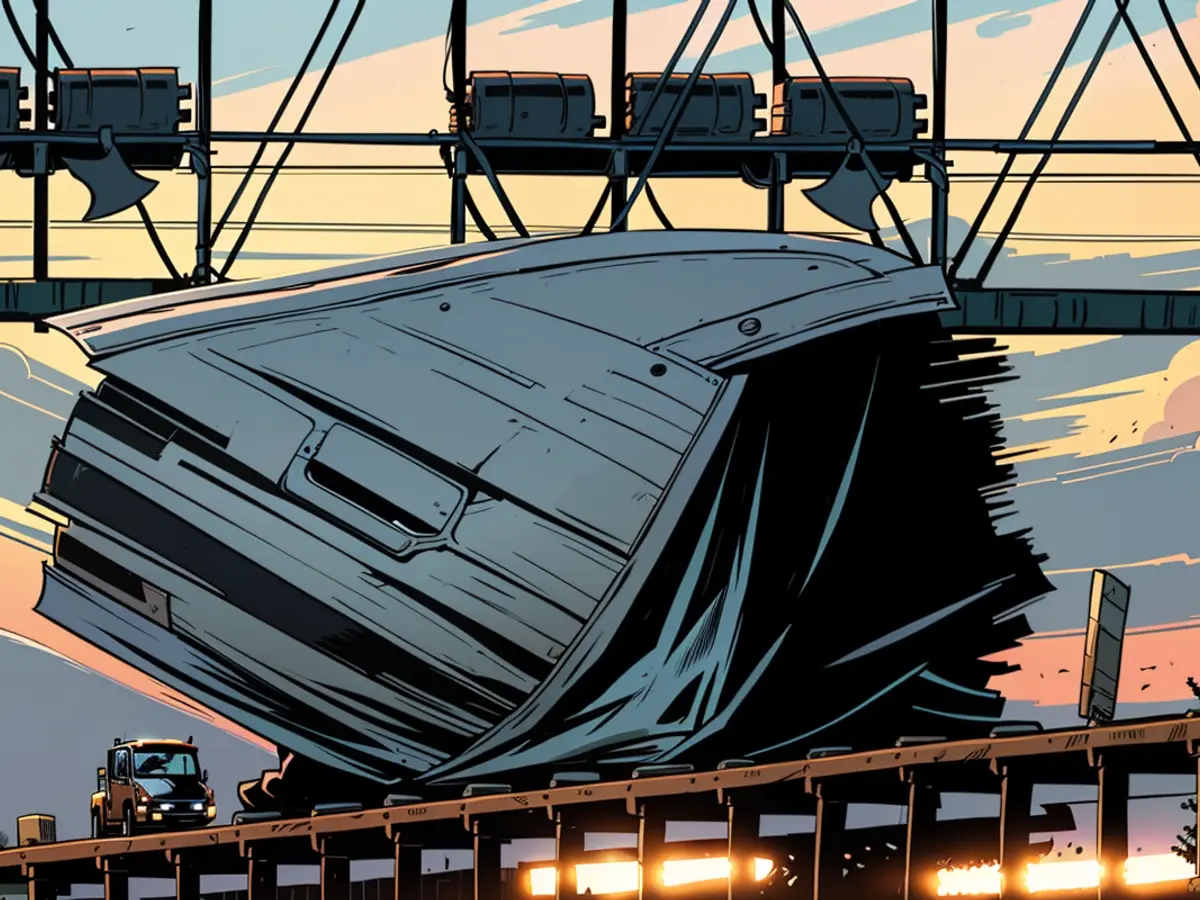Traffic - Truck toll to be extended - exceptions for tradespeople
On Monday, the Lkw-Maut (heavy goods vehicle tax) in Germany will be extended. For the use of autobahans and federal roads, vehicles with a technically permissible total weight above 3.5 tons will be subject to the tax, which are used for goods transport - exceptions apply for craftsmen. The state will bring in billions in additional revenues from this.
Billions in Revenues from Lkw-Maut
The Lkw-Maut was introduced in Germany in 2005 on federal autobahans and has since been extended to all federal roads. It currently applies to vehicles with a technically permissible total weight of at least 7.5 tons. A CO2 surcharge was also introduced. According to the Transport Ministry, revenues from the Lkw-Maut amounted to around 7.4 billion Euros in 2023.
The revenues from the Lkw-Maut - after deducting the costs of collection, control, and harmonization - are used half for federal highways and the other half for measures in the field of mobility, primarily for railways, according to the Ministry. The Lkw-Maut is a significant revenue source for the federal government for the maintenance and expansion of transport networks.
Extension of Lkw-Maut
The changes to the Lkw-Maut are based on the coalition agreement between the SPD, Greens, and FDP in 2021. It states, among other things, that commercial goods transport below 3.5 tons should be included. Revenues should be used for mobility.
The craftsman exemption states: Vehicles with less than 7.5 tons of technically permissible total weight are exempt from the Lkw-Maut if they are needed for the transportation of materials, equipment, or machines, or for the delivery of handcrafted goods. The Federal Office for Logistics and Mobility has published a list of craft occupations that fall under the exemption. Handcraft vehicles used under the conditions of the exemption can be registered with the Lkw-Maut collector Toll Collect.
A spokesperson for the Transport Ministry stated, roughly 330,000 vehicles are estimated to be affected by the expansion of the taxable base. The projected additional revenues amounted to around 500 million Euros in 2024 and around 1.2 billion Euros in subsequent years - including revenues from a CO2 surcharge for traffic-related CO2 emissions. The actual Maut revenues depend significantly on the economic development.
Handwork for Repairs
"It's pleasing that politics has listened to the situation of craft businesses regarding the Lkw-Maut," said Jörg Dittrich, President of the Central Association of German Crafts. Rightly so, crafts have been largely exempted from the extension. "It's important and central that no additional costs accrue to the businesses."
According to Dittrich, the bureaucracy associated with the toll exemption for registration is quite manageable. However, some unnecessary and burdensome regulatory details, such as the toll requirement for trips to the workshop or a strict definition of toll-exempt handicraft production in the food industry, need to be improved in practice. Christian Hirte, an CDU parliamentarian, stated that significantly more commercial activities should be exempted from the toll.
Regarding mobile homes, the ADAC states that most of them are easily identifiable as mobile homes for toll control systems from the outside and remain toll-free due to the lack of bureaucratic effort. In general, there is no toll obligation for vehicles that are permanently and fixedly equipped with living quarters, such as beds and living space, and are used exclusively for passenger transportation. However, according to the ADAC, there are numerous vehicles on LKW or omnibus chassis that do not appear clearly as mobile homes from the outside and some of them are even on the road with LKW registration. Therefore, it is recommended to obtain a "other vehicle" car registration as a mobile home.
- The coalition agreement between the SPD, Greens, and FDP in Germany, signed in 2021, included plans to extend the Lkw-Maut to include commercial goods transport below 3.5 tons.
- Jörg Dittrich, President of the Central Association of German Crafts, praised the fact that craft businesses were largely exempted from the extension of the Lkw-Maut.
- The main road through Berlin is expected to see an increase in truck traffic once the Lkw-Maut is extended to include vehicles with a technically permissible total weight above 3.5 tons.
- The additional income generated from the extension of the Lkw-Maut will be allocated to federal highways and mobility measures, according to the Ministry of Transport.
- Coalition parties SPD, Greens, and FDP agreed that revenues from the Lkw-Maut should be used for mobility, including railways and other transportation infrastructure.
- The SPD and FDP are both part of the coalition government in Germany, and the extension of the Lkw-Maut is one of their policies implemented through the coalition agreement.








